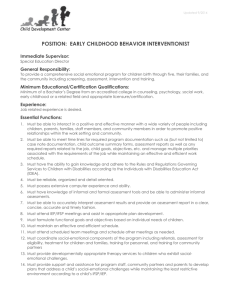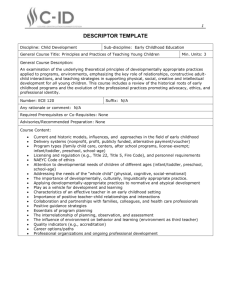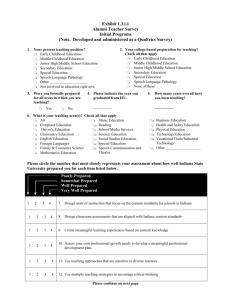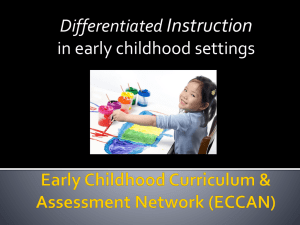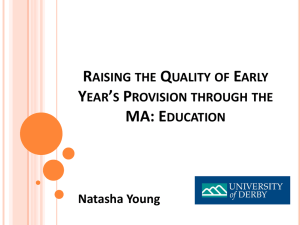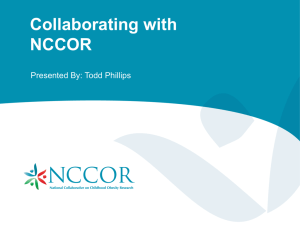9.02 History of ECE Programs
advertisement
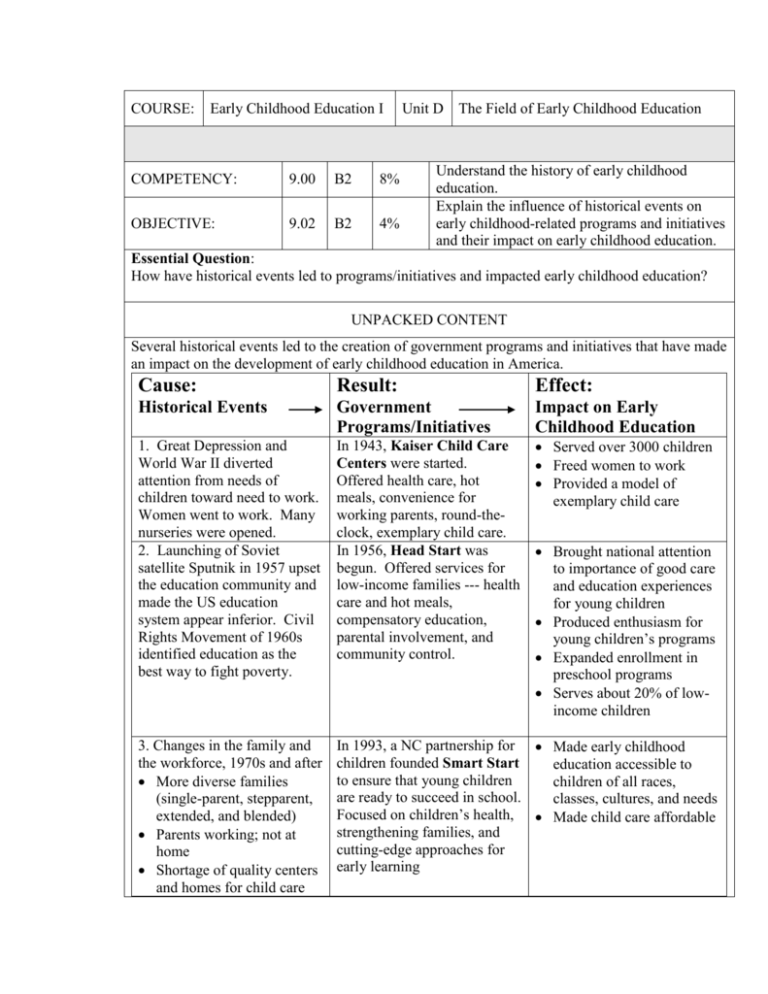
COURSE: Early Childhood Education I COMPETENCY: 9.00 B2 8% OBJECTIVE: 9.02 B2 4% Unit D The Field of Early Childhood Education Understand the history of early childhood education. Explain the influence of historical events on early childhood-related programs and initiatives and their impact on early childhood education. Essential Question: How have historical events led to programs/initiatives and impacted early childhood education? UNPACKED CONTENT Several historical events led to the creation of government programs and initiatives that have made an impact on the development of early childhood education in America. Cause: Result: Effect: Historical Events Government Programs/Initiatives Impact on Early Childhood Education 1. Great Depression and World War II diverted attention from needs of children toward need to work. Women went to work. Many nurseries were opened. 2. Launching of Soviet satellite Sputnik in 1957 upset the education community and made the US education system appear inferior. Civil Rights Movement of 1960s identified education as the best way to fight poverty. In 1943, Kaiser Child Care Centers were started. Offered health care, hot meals, convenience for working parents, round-theclock, exemplary child care. In 1956, Head Start was begun. Offered services for low-income families --- health care and hot meals, compensatory education, parental involvement, and community control. Served over 3000 children Freed women to work Provided a model of exemplary child care 3. Changes in the family and the workforce, 1970s and after More diverse families (single-parent, stepparent, extended, and blended) Parents working; not at home Shortage of quality centers and homes for child care In 1993, a NC partnership for Made early childhood children founded Smart Start education accessible to to ensure that young children children of all races, are ready to succeed in school. classes, cultures, and needs Focused on children’s health, Made child care affordable strengthening families, and cutting-edge approaches for early learning Brought national attention to importance of good care and education experiences for young children Produced enthusiasm for young children’s programs Expanded enrollment in preschool programs Serves about 20% of lowincome children OBJECTIVE: 9.02 B2 4% Explain the influence of historical events on early childhood-related programs and initiatives and their impact on early childhood education. UNPACKED CONTENT Cause: Result: Effect: Historical Events Government Programs/Initiatives Impact on Early Childhood Education 4. Increased emphasis on quality education and greater success for every child in the 1990s and after led to the conclusion that no child should be left behind In 2001, a national program called No Child Left Behind (NCLB) was created by the Department of Education. NCLB includes higher standards, greater accountability, expanded options for parents, and proven teaching methods. 5. Emphasis on quality education and recognition of the importance of early learning in 1990s and after led to intervention efforts with atrisk four-year-old children. 6. Globalization of economy and emphasis on futurefocused education in 2000 and after led to recognition of the importance of adapting curriculum to prepare students for the 21st century. Accurate assessment of student performance Effective development materials for children Increased student an teacher accountability Individualized and comprehensive reporting At-home activities to better involve parents In 2002, a state-funded NC High-quality classroominitiative called More at Four based educational program Pre-Kindergarten was Children served in a created. Focused on variety of settings (public underserved children, schools, for-profit and especially those who had nonprofit child care, Head never before been served in a Start, combination settings) pre-K program. Financial assistance given Serves diverse groups Detailed planning of objectives for children In 2002, a partnership of 27 member organizations was formed to address 21st Century Skills. In 2005, NC created the first Center for 21st Century Skills. In 2006, NC State Board of Education endorsed a framework for education based on 21st century skills and content – including life skills, 21st century content, core content, thinking skills, and ICT technology skills. Expanded academic enrichment for children Opportunities for children and families to learn after school year ends Tutorial services Art, music, and recreation programs Helps children meet standards in reading and math



